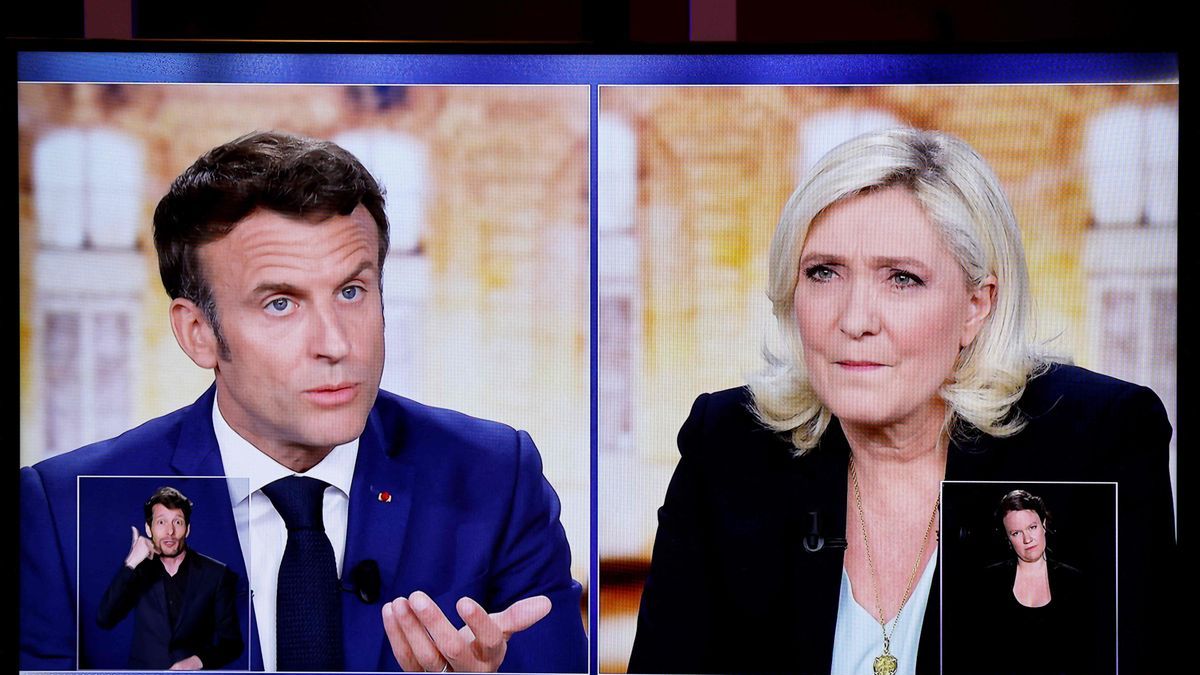“You depend on Russian power and on Mr. Putin. You talk to your banker when you talk about Russia,” Macron told his rival from National Association (RN)during the only televised face-to-face between the two before Sunday’s second round.
During the Russian invasion of Ukrainewhich brought back the fears of the French about the increase in inflation and the loss of purchasing power, the president seeks to present Marine Le Pen as complacent with Moscow and warn of its foreign policy.
“It is not true and it is quite dishonest,” replied his rival. In 2014, his party contracted a loan of 9 million euros (about 9.8 million dollars) – which he still pays back – to a Russian bank, because no bank in France wanted to remember him, he defended.
In foreign policy, Marine Le Pen proposes leaving NATO’s integrated command, which sets the military strategy of the Alliance, although no longer of the euro. His election would be a setback to the European Union (EU), which wants to reform, after the re-election of the Hungarian Victor Orbán.
“This election is also a referendum for or against the EU”, “of an ecological ambition”, “of secularism, fraternity”, warned Macron, who advocated “a strong Europe, with strong powers like France” to weigh on the world stage.
Hours before the debate, both the Russian opposition Alexei Navalniin prison in his country, as well as the president of Ukraine, Volodymyr Zelensky, pointed out the relationship between the far-right and Putin. The Ukrainian urged Marine Le Pen to admit that she “was wrong”.
To clear up doubts, the heiress of the National Front (FN) reiterated that the “aggression of the Ukrainian people is inadmissible” and said she supported “a free Ukraine”, independent of the United States, the EU and Russia.
France repeats the final duel of 2017, but the country is not the same. Meanwhile, a series of social protests, such as the “yellow vests”, shook Macron’s mandate, a pandemic confined millions of people and the war returned to the eastern reaches of Europe.
“For five years, I have seen the people of France suffer, worry about the future and doubt. Another election is possible,” said Marine Le Pen, 53, who presented herself as the president of “freedom”, of the ” purchasing power” and “national brotherhood”.
Although Macron leads Le Pen by 12 points, according to the latest Ipsos/Sopra Steria barometer, only 69% of those registered say they are sure they will vote, including about 6 out of 10 voters for the leftist Jean-Luc Mélenchonwhich both candidates seek to attract and mobilize.
President Macron, a 44-year-old candidate for the Republic on the Move (LREM), estimated that his rival’s proposal to ban the Islamic veil in public would lead to a “civil war” in France.
Marine Le Pen described, for her part, as “absolutely unbearable injustice” Macron’s star proposal of delay the retirement age from 62 to 65though this one opened to only set her back to 64 in a nod to leftist voters.
Unlike 2017, when with 66.1% of the votes he was proclaimed president for the first time, Macron had to defend his administration, marked by crises and protests against the policies of the popular classes.
The president defended his balance, as well as the reformist and liberal impulse that he intends to recover. To “finance” the pension system, it is necessary to “work progressively more”, defended the head of state
According to the Ipsos/Sopra Steria barometer, Marine Le Pen is considered the one who best understands the problems of the people and Macron, as the one with the best international image. Both are “too authoritarian” for half of the French.
During the televised debate, tense but more cordial than five years ago, the candidates tried to project that image of their opponent. “I try to put myself in the place of the people,” the far-rightist told her rival.
The candidate presented a calmer profile than in 2017, when she was criticized for her “aggressiveness” and “lack of preparation”, which did not free her from Macron’s criticism: her program “has neither head nor tail” .
On Sunday night, the name of who will preside over France for the next five years will be known and the June legislative campaign will begin, which will define with which parliamentary majority it will govern, something uncertain in a political board in recomposition.
Source: Ambito
David William is a talented author who has made a name for himself in the world of writing. He is a professional author who writes on a wide range of topics, from general interest to opinion news. David is currently working as a writer at 24 hours worlds where he brings his unique perspective and in-depth research to his articles, making them both informative and engaging.




